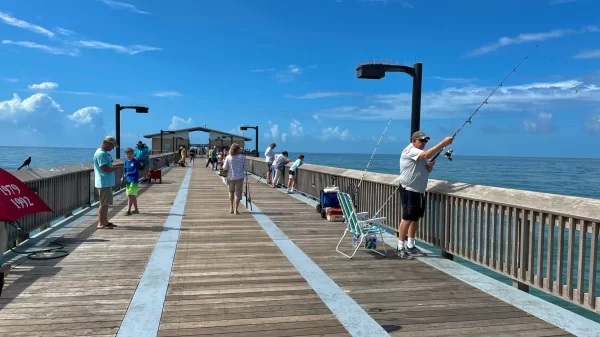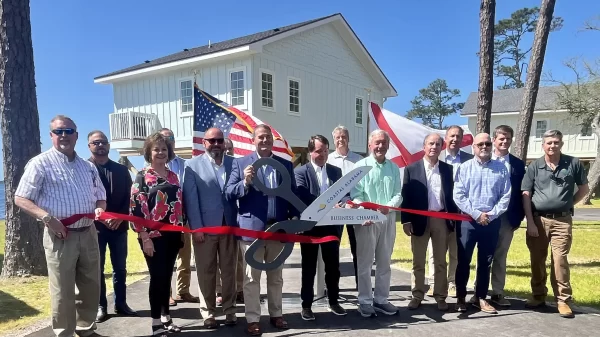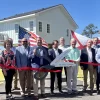By Beth Clayton
MONTGOMERY–The debate over plans for Gulf State Park continued in the House Economic Development and Tourism committee Thursday afternoon. The bill, sponsored by Senator Trip Pittman (R- Daphne), would allow a 29 acre tract of land in Gulf State Park to be leased out to develop a lodge and conference center.
“We’re losing convention business because we just do not have the facilities to accommodate conventions,” said Representative Steve McMillan (R-Bay Minette), who introduced the bill to the house committee.
“It will be a facility the people of Alabama will be proud of,” said David Perry, Governor Bentley’s chief of staff.
Throughout the debate, the same issues continued to arise regarding this bill. During the public hearing, Representative Joe Hubbard (D-Montgomery) questioned the word choice and expedited rate that many legislators wanted to pass the bill. Following the committee hearing, it became clear that the amendments had been dropped, raising concerns about gambling on the property. Despite the concerns, the bill will go to the House floor next week.
Lack of a gambling amendment
When the bill was in the senate committee, they attached three amendments to the bill, most notably an amendment to prohibit gambling from taking place on this property at this or any future point.
Right now, gambling is illegal in Alabama except on Indian land, which is federally protected. The amendment would have prohibited gambling on the park property, even in the event that gambling becomes legal during the duration of the lease.
When the bill arrived in the Senate, Pittman stripped the amendments from the bill in an effort to expedite the process of passing the legislation.
Pittman explained that multiple amendments were causing the debate to last too long, which threatened the chance of getting the legislation passed through the House and signed before the end of the session.
“Every time this bill has ever come up, we’ve always been able to put that [gambling prohibition] in there…Now that its about to pass, it’s not in there,” said John Rice, a lobbyist against the bill.
“This is huge,” Rice said. “If you were ever going to build a casino in Alabama, where would you put it?”
Pittman says that he would support a supplemental bill or amendment next year to add in gambling prohibition to the bill. “I was the one who added the amendment…I am concerned about it.”
Pittman encourages the House to go ahead and pass the legislation, rather than adding an amendment and sending it back to the Senate.
Why rush the bill?
This leads to the next concern- Why is it so important to go ahead and pass the legislation, even while it admittedly has holes?
“This is something that has been worked on for a long time,” Pittman said.
The project is planned to be funded by money from the National Resource Damage Assessment (NRDA) from the BP oil spill. “We’re optimistic BP will be paying within the next months or the next year,” Pittman said.
When projects in the past have been stopped because of lawsuits or other issues, the money set aside for those projects is lost, Pittman said. “If we don’t have this bill there in order to move forward with the project when the money comes, there’s a real likelihood the money will be gone, and we will lose the opportunity,” he said.
Hubbard was not satisfied with this answer. He became frustrated in the committee meeting because the legislation was being pushed through so quickly, even with a typographical error and a concern over word usage.
Hubbard reminded the committee that they were sent to Montgomery to enact the best legislation possible, and he felt it was irresponsible to move forward without the best bill possible.
“Whatever we do, by goodness it should be right when we pass it…to the best of our ability to do so,” Hubbard said.
Requests for Proposals
Lastly, we come to the word that caused all of the trouble for the committee: “may.”
In section 4, subsection a, the bill reads, “The governor may issue requests for proposals, in part or in whole, for the construction, development, improvement, lease, and beneficial use of a project to persons whom the Governor shall have determined are qualified.”
Many opponents of the legislation would like to see the word ‘may’ changed to the word ‘shall,’ which would force the Governor to issue a request for proposals (RFP), should they decide to move forward with the project.
McMillan contended that the word ‘may’ was used to indicate that the Governor may or may not proceed with the project, depending on the results of a current market feasibility study.
“We don’t know if or when money will come in from NRDA or other sources,” Perry said. “But we intend to move forward with the market feasibility study so we can be prepared to move forward if it makes sense and when the money hits,” he said.
The current market feasibility study should be complete by late summer or early fall, Perry said.
Hubbard, along with John Teague, a lobbyist opposing the bill, said that the word ‘may’ would allow the government to be in the position to select the firms to contract to do the work. By using the word ‘shall,’ it requires the Governor to issue RFPs if he chooses to move forward, they said.
“If you don’t want to put out an RFP, you don’t have to. That’s just common sense. If you have no reason to put out an RFP, you don’t have to,” Teague said.
If the line were to be changed to ‘shall,’ it still wouldn’t compel the Governor to put out an RFP, unless he decided to move forward, at which point he would “bid it off,” Teague explained.
The way Teague interprets the bill, the word ‘may’ allows the Governor the ability to “anoint the contractor, the plans, whatever,” he said.
Hubbard proposed an amendment to change ‘may’ to ‘shall,’ which was seconded by Representative Napoleon Bracy (D-Prichard), but the amendment failed to pass in committee.
Next steps forward
The bill as written will move to the House for a vote next week.


















































